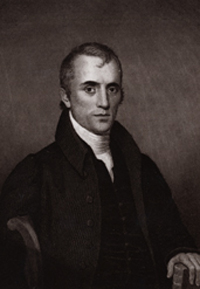Wesleyan's First President
 |
Willbur Fisk1831-1839 "Education should be directed in reference to two objects-the good of the individual educated and the good of the world." |
|---|
With this quote from his inaugural address as the first president of Wesleyan, Willbur Fisk expressed his personal educational philosophy, a philosophy that was a synthesis of his varied life experiences and an educational philosophy that was ahead of its time.
Willbur Fisk was born on August 31, 1792, in Guilford, Vermont. Educated primarily at home, he enrolled in Burlington College (now the University of Vermont), where classes were suspended for two years during the War of 1812. After the war ended, he transferred to Brown University, where he received his B.A. degree.
He intended to study law and returned to Vermont, but a year later decided against a legal career and became a private tutor in Maryland. Plagued by chronic respiratory illness from the time he was young, he suffered a relapse in Maryland and returned to Vermont. He became a Methodist minister and for the next few years was a highly successful itinerant preacher.
Eventually, he decided to combine his interest in education with the ministry, was appointed principal of Wesleyan Academy in Wilbraham, Mass., and from there was offered the presidency of the new Wesleyan University.
In his inaugural speech, he recognized seven "strikingly modern points," according to James L. McConaughy, a later president of Wesleyan: the importance of the international aspects of education arising from increased travel and commerce between nations; the need for physical training or athletics; a vision of the college as a place where a student learns to learn; a broad curriculum, with more science and modern languages; the classification of students by accomplishment; faculty salaries based on service, not rank; and the abolition of life tenure for professors.
With his stimulating personality, Fisk was an inspiration to the students as well as a successful fundraiser for the new institution. He emphasized education for general interest, not for sectarian purposes, a position that other New England colleges later adopted.
Fisk was opposed to slavery and favored the repatriation of slaves to Africa, but also considered the abolitionists too extreme. He was an early advocate of temperance.
In 1835, Fisk suffered another relapse of his chronic illness and took a year off to travel in Europe. Upon his return in 1836, he resumed his duties as president until his final illness and subsequent death on February 22, 1839.
